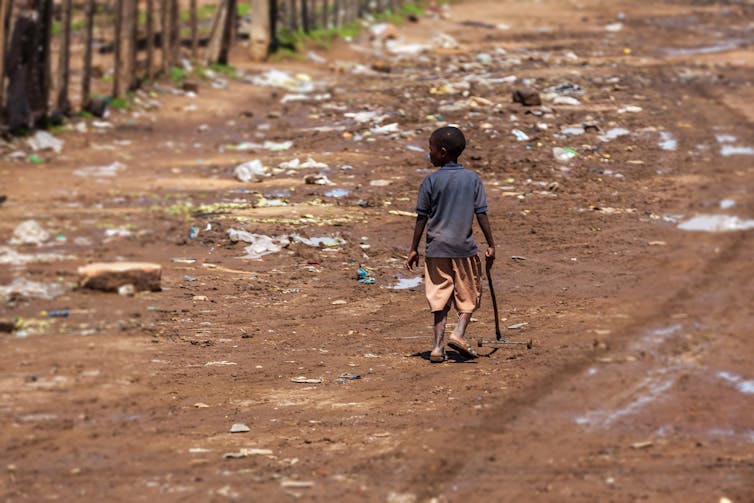
Two-thirds of children in sub-Saharan Africa face all manners of hardship. These include poor living conditions, low educational outcomes, high levels of malnutrition and often high risks of exposure to different forms of violence. One in five children in sub-Saharan Africa are estimated to grow up in extreme “monetary” poverty, meaning they live in families without adequate incomes to make basic ends meet.
Growing up in poverty has long-lasting adverse consequences for children and the societies that they live in. Poverty undermines children’s immediate wellbeing as well as biological and cognitive development. In the long-run, this untapped potential hampers economic and social progress.
As the world marks the international day for the eradication of poverty it’s worth trying to identify answers and evidence in the fight against child poverty.
A recently published book, “Putting Children First: New Frontiers in the Fight Against Child Poverty in Africa”, offers insights based on evidence in support of more effective policy initiatives that can address child poverty in Africa in all its different dimensions.
The book follows an international conference in Addis Ababa in October 2017 that brought together researchers, policy makers and civil society to share lessons learned and identify new efforts in tackling child poverty in the region. Main themes included the measurement and analysis of child poverty, the use of social protection in addressing child poverty, and opportunities and obstacles for children as they transition into adulthood. The book includes contributions on these themes based on research from across sub-Saharan Africa.
Across the range of diverse and rich research, we can distil two key messages in moving forward.
The first is that child poverty has strong psychosocial and relational dimensions that are frequently overlooked. They deserve more attention. This holds in relation to both measurement of child poverty and efforts to reduce it.
The second is that policies need to address the complex nature of child poverty – not simply one or two dimensions.
The psychological and the social effects
Sustainable Development Goal 1 (SDG1) stipulates that poverty should be ended in all its forms. It also calls for the reduction of poverty in all its dimensions for all children. Against this backdrop, it is now widely accepted that different measures lead to differential estimates of poverty. Each identifies different groups of children as being poor.
Nevertheless, current quantitative understandings of poverty overlook important psychosocial and relational issues that are core components of children’s experiences of living in poverty.
The importance of the psychosocial side of poverty – also for children – is gaining acknowledgement. It is increasingly reflected in efforts to measure and understand child poverty. For instance, this includes a greater focus on the experience of shame and stigma in relation to poverty.
For example, children in Uganda experience the shame of poverty at home, in school and within the community. Such experiences may in turn hold children back in their development. Incorporating these issues in the study of child poverty is crucial for understanding the complex realities of children’s lives.
Acknowledgement of the psychosocial side of poverty is also important for formulating policies that more adequately respond to children’s multifaceted needs and vulnerabilities. This is shown in research that highlights the importance for relations and social connectedness.
In South Africa, research found that young people who were engaged in a programme that aimed to reduce social isolation and to improve social relations gave them a sense of energy, discipline and a more positive attitude. In turn, this increased their chances of getting a job.
No quick fixes
Policies need to address in all the complexities of child poverty.
A case in point is social protection policy. SDG1 specifically refers to social protection as the policy measure to address poverty. In the last decade, social protection has become a central part of global and national development agendas. It is now widely recognised as one of the foremost policy interventions for fighting child poverty.
A wide evidence base provides testimony that social protection – and cash transfers in particular -— can increase school enrolment, reduce child labour and improve access to health services.
Notwithstanding these positive effects, research also increasingly points to the limitations of a cash-only approach. Malnutrition is a poignant example. Cash transfers, which have led to improved food security and dietary diversity among families and children, have done litte to reduce malnutrition.
This lack of impact has given rise to the call for interventions that combine cash with complementary support and services. Such ‘cash plus’ approaches combine regular cash transfers with benefits such as food supplements; information provision and coaching; or referral to other services. New initiatives also integrate insights from behavioural science, which seek to make it easier for people to make positive change.
In Madagascar, for example, women engage in goal-setting activities that allow for more careful planning on how they spend their cash transfers. Early feedback suggests that women felt better being able to prioritise their spending, particularly in relation to children.
Looking forward
The reality is that many children and their families continue to struggle to make basic ends meet. It is therefore imperative that we find new ways of addressing child poverty that build on and extend successes from the past.
Lessons learned and a wealth of research allow us to cast a way forward. New frontiers in the fight against child poverty must move beyond singular responses. They must consider children’s multiple needs and vulnerabilities, including relational and psychosocial ones.![]()
Keetie Roelen, Research Fellow, Co-Director, Centre for Social Protection, Institute of Development Studies, University of Sussex
This article is republished from The Conversation under a Creative Commons license. Read the original article.

